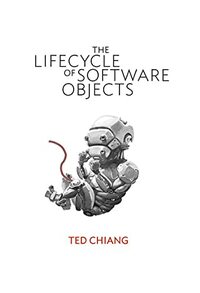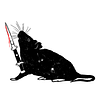Take a photo of a barcode or cover
emotional
inspiring
reflective
fast-paced
Explores the relationship between human and AI with focus on emotions. How would emotions impact the training of AI? AI learning based on real-world experience similar to human experiencing the world
Read for Hugo Award 2011 voting - nominated for best novella.
Páčila sa mi eticko-filozofická bodka na konci o možnom dopade human-level AI na spoločnosť a ako by sme k nej mali pristupovať.
Now I need the literate alternative of eye bleach. Sure the book does evoke strong emotions, but the way it does leaves me feel exploited (after reading the book you'd know why this is my choice of words). I'm not sure therefore if I should give it 1 or 5 stars.
To read this book now is also a strange experience, because one can imagine anything in the book to be feasible now. Probably Chiang didn't think the scenarios he wrote about would be a probability within 15 years, but here we are.
To read this book now is also a strange experience, because one can imagine anything in the book to be feasible now. Probably Chiang didn't think the scenarios he wrote about would be a probability within 15 years, but here we are.
I am normally such a Chiang fangal, but I loathed this story on so many levels.
II will try and articulate my issues with this when I have more brain and extremely painful eye injury have calmed down some, suffice to say I did not enjoy at all.
II will try and articulate my issues with this when I have more brain and extremely painful eye injury have calmed down some, suffice to say I did not enjoy at all.
In this novella, Chiang’s characters experience the ups and downs of raising an artificial intelligence. The owners of the artificial beings begin as employees of a company that sells them as virtual-world pets, but when the company fails, they choose not to suspend their charges and complicated questions begin to emerge around the "personhood" of the maturing beings. The large weakness of this well-crafted story is that very little happens in terms of human drama. One could hang an entire novel on the framework of the plot and the philosophical questions it engenders, but the human story is stretched too thin to offer the poignancy that this novella deserves.
lighthearted
medium-paced
Plot or Character Driven:
A mix
Strong character development:
Complicated
Loveable characters:
No
Diverse cast of characters:
Complicated
Flaws of characters a main focus:
Complicated
There is a writing aphorism that you should show and not tell, but Chiang either has never heard of it or thinks very little of his reader's ability to interpret subtext. There's a monologue by one of the protagonists basically laying bare his Nice Guy Tragedy, and it was painful to read both because of its content and because of the absolute lack of artistry in the writing of it. Where humans attempting to interact with each other are involved, the story feels as stilted as a dancer at Carnivale.
The rest of the book feels like the kind of version of Bicentennial Man that a software engineer would write. Chiang unsurprisingly has a degree in Computer Science and does work as a technical writer. Asimov's scope is a large reason of why that story worked, though, and tackled a wide swath of issues and ideas stemming from synthetic life. Meanwhile Chiang spans all of maybe ten years and spends most of that focused on startup yuppies raising their artificial children.
The only saving grace is that some of the speculative stuff in it is actually interesting. Software genomes, emergent animation... these are interesting things, but their delivery never really outshone the ideas themselves, and if felt like Chiang never really delved past the very surface of those ideas.
The story is available online: [link]
The rest of the book feels like the kind of version of Bicentennial Man that a software engineer would write. Chiang unsurprisingly has a degree in Computer Science and does work as a technical writer. Asimov's scope is a large reason of why that story worked, though, and tackled a wide swath of issues and ideas stemming from synthetic life. Meanwhile Chiang spans all of maybe ten years and spends most of that focused on startup yuppies raising their artificial children.
The only saving grace is that some of the speculative stuff in it is actually interesting. Software genomes, emergent animation... these are interesting things, but their delivery never really outshone the ideas themselves, and if felt like Chiang never really delved past the very surface of those ideas.
The story is available online: [link]





